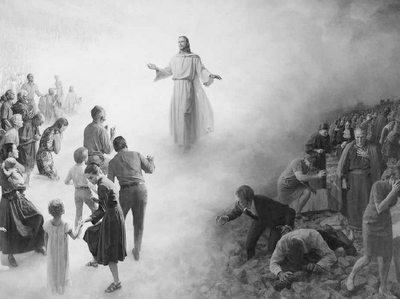“Holy, Holy, Holy, is the Lord of hosts, the whole earth is full of His glory.” -Isaiah 6:3
Good evening son,
You and I recently had a conversation about the battle between good and evil. We discussed how in recent years, evil has become more noticeable and more aggressive, if only in the headlines we read and how we’ve experienced it in this country, at least compared to what used to be not that many years ago. What I experienced fifty years ago and what you experienced twenty five years ago, is nothing compared to what your children are facing and will face today and in the future. During our conversation, I mentioned that Satan and God both desire our worship, and that this battle between good and evil is the result. You then asked, rhetorically I imagine, “What’s the point?” The short answer is, that in and through it all, God receives glory.
King Solomon struggled with the same question, and wrote about it in the book of Ecclesiastes. After he’d asked what’s the point or why, over and over again, he concluded that everything in this world is vanity, or meaningless, but at the very end of the book he wrote this, “The conclusion, when all has been heard, is: fear God and keep his commandments, because this applies to every person. For God will bring every act to judgment, everything which is hidden, whether it is good or evil.” (Ecclesiastes 12:13-14) Since I’ve had time to ponder your question, here’s a longer answer with a bigger picture view as I understand it. To better understand this battle, you must first recognize the difference between the spiritual world, of which you’re familiar, and the physical world, in which we live. One being eternal and one being temporal.
Because of John’s writings in Revelation, we get a glimpse of how things are in that spiritual realm and how they ought to be here. Taken to heaven in the spirit, John wrote of what he saw there, of how all creation, constant and never ceasing, gives glory and honor and praise to the God of the universe. All creation, all living creatures, giving him who sits on the throne, glory and honor and thanks. Why? There are two main reasons. One, because of who God is:
“Holy, holy, holy, is the Lord God, the Almighty, who was and who is and who is to come.” (Revelation 4:8)
God has no beginning, no end. He is. Time was invented for our benefit. With God, there is no time. As he told Moses to tell the sons of Israel on whose behalf he was sent, “‘I AM has sent me to you.'” God has always been and will always be. There is only one Lord God Almighty, and he has existed forever.
The second reason God deserves all honor and glory and praise is because of what he’s done:
“Worthy art Thou, our Lord and our God, to receive glory and honor and power; for Thou didst create all things, and because of Thy will they existed, and were created.” (Revelation 4:11)
So, God created everything, for his glory. All the stars and planets and universes and solar systems, and every living thing, including and especially humans, he created. For his glory. Although there are many verses in scripture that describe God’s glory in creation, Paul sums it up well in Colossians 1:16. Speaking of Jesus, who was there at creation, Paul says, “For by Him all things were created, both in the heavens and on earth, visible and invisible, whether thrones or dominions or rulers or authorities–all things have been created by Him and for Him. And He is before all things, and in Him all things hold together.” We have no problem worshiping, praising, honoring, adoring, rock stars, athletes, movie stars, and British royalty, simply because they can dunk a basketball or sing or act, and yet, how much more should we honor the God of all creation? The whole earth declares his glory, so why is it so hard for humans? I’ve described the good, all things God, but what about the evil? It is that evil which explains the answer to the previous question of why humans struggle so much to declare God’s glory.
Evil started in heaven, with that being we call Satan or Lucifer or the devil. At one point, Satan wanted to make himself equal with God, to steal some of God’s glory. Here is how Satan is described in Isaiah 14: 12-15:
“How you have fallen from heaven, O star of the morning, son of the dawn! You have been cut down to the earth, you who have weakened the nations! But you said in your heart, ‘I will ascend to heaven; I will raise my throne above the stars of God, and I will sit on the mount of the assembly in the recesses of the north. I will ascend above the heights of the clouds; I will make myself like the Most High.’ Nevertheless you will be thrust down to Sheol, to the recesses of the pit.”
God said this to Isaiah the prophet, “I am the Lord, that is My name; I will not give My glory to another, nor My praise to graven images.” And because Satan tried to steal God’s glory, he was cast out of heaven. Here is how it is described in Revelation 12:7-9:
And there was war in heaven, Michael and his angels waging war with the dragon. And the dragon and his angels waged war, and they were not strong enough, and there was no longer a place found for them in heaven. And the great dragon was thrown down, the serpent of old who is called the devil and Satan, who deceives the whole world; he was thrown down to the earth, and his angels were thrown down with him.
So, even though Satan was cast down to the earth, his desire for glory was not satisfied. His first act, after God had placed his creation in the garden, humans made in his image, was to corrupt Adam and Eve by deception and lying, as Satan is the father of lies. He questioned Eve as to what God had instructed her about eating from the tree in the middle of the garden and what would happen if she did, and then deceived her with the big lie, “You surely shall not die! For God knows that in the day you eat from it your eyes will be opened, and you will be like God, knowing good and evil.” And thus, sin entered into the world, separating man from God. And Satan continues to deceive man, in an effort to destroy him. He knows his eventual destination, hell, and wants to take as many humans with him as possible. Satan brought to earth all death, destruction, sickness, sorrow, pain, and suffering. All evil belongs to him.
Paul describes the spiritual world, and the ongoing war, in Ephesians 6:12, For our struggle is not against flesh and blood, but against the rulers, against the powers, against the world forces of this darkness, against the spiritual forces of wickedness in the heavenly places.
This battle rages all around us. The book of Job gives a glimpse into how Satan tries to turn humans away from God, and how he can only do as much as God allows him. And yet, after all Satan did to him and his family, Job did not lose his integrity and sin against the Lord. And through it all, God was glorified. And after a few thousand years of Satan corrupting the earth and man, God placed himself in the middle of it all, in the form of his Son, Jesus Christ, to solve the issue once and for all, to reconcile man back to himself. And what did Satan do? He tempted Jesus by offering him all the kingdoms of the world if he would just worship him (Matthew 4). But Jesus resisted. And when Jesus hung on the cross, Satan thought he’d won. But because of the resurrection, Satan and death were defeated, and Satan no longer has the power over man that he once did. We no longer have to fear the one who can destroy the body, but cannot destroy the soul.
So, what about America in the year 2024? Why is evil so prevalent now more than in the past. Jesus talked about what happens when a demon is driven from a man in Matthew 12:43-45, “When an unclean spirit goes out of a man, it passes through dry places seeking rest, but finds none. Then it says, ‘I will return to my house from which I came.’ And when it comes, it finds it empty, swept, and put in order. Then it goes and brings with itself seven other spirits more evil than itself, and they enter and dwell there. And the last state of that man is worse than the first. So shall it be also with this evil generation.” Year after year, more Americans turn away from God and go their own way. I believe a nation is much like that demon possessed man described by Jesus. As the nation turns away from God, his Spirit is quenched and loses its influence, and the resulting void is filled by evil spirits. We can see it happening all around us. A nation once filled with Christians, serious about their faith, a people who once gave glory to God, who once worshipped him and honored him, no longer do, and the country isn’t the same.
And in the midst of it, Christians suffer. Much like they have for centuries. Paul wrote to the Philippian church, encouraging them to, prove yourselves to be blameless and innocent, children of God above reproach in the midst of a crooked and perverse generation, among whom you appear as lights in the world... (Philippians 2:15) If we do, this too will glorify God.
Paul also wrote in Romans that our unrighteousness demonstrates the righteousness of God. Put another way, without evil, we wouldn’t know good. Apart from God, mankind cannot do good. Apart from God, man has no morals. It is only because of God’s influence that we aren’t living in a dystopian hell on earth. But as mankind chooses to turn away from God, as he has so many times throughout history, Satan becomes emboldened and evil flourishes.
So, what does it all mean? What’s the point? The end of the story has been written. Jesus will return and Satan will be cast into the abyss for 1000 years and then into the lake of fire and brimstone, to be tormented forever more (Revelation 20). And those who choose Satan over God will join him there. However, those who choose the Savior of the world, Jesus, will reign with him forever in God’s presence, in heaven. Meanwhile, Satan tries to deceive as many people as possible. And every time a sinner repents and gives his life to the Lord, God is glorified. And every time anyone resists the devil’s temptations, God is glorified. And when a man lives a life of integrity, as Job did, not letting Satan deceive him, God is glorified.
Paraphrasing your brother, this life is just preparation for a destination. The sad truth is, each of us chooses his own destination. God does not force us to give him glory and worship him, he gives us free will, but he does force us to choose. Over time, God has demonstrated who he is, good. Satan has demonstrated who he is, evil. The choice is stark. It isn’t ambiguous. And when someone chooses Jesus, God is glorified.
That’s the point, my son.
If you enjoyed reading this post, you might also enjoy my book, Pondering God.











